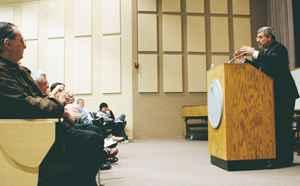Rami Khouri. An acclaimed author. An international political columnist. A visitor on Monday afternoon at N.C. State’s Witherspoon Theater.
Khouri has written for The Washington Post, The Boston Globe and is the editor of a Lebanon-based newspaper, Daily Star. Originally a Palestinian and Jordanian, Khouri is a U.S. citizen and has family spread out all over the Middle East.
Khouri lectured on democracy and media in the Middle East and said he had a debt to pay to the “fine faculty of NCSU.”
“I have a link to N.C. State,” Khouri said. “A professor of history at this institution, Tom Parker, is an old friend of mine from Jordan. I am doubly delighted to be here.”
Khouri commented on the role of the media in the Middle East and the “enormous state of flux” in the Middle East.
“The Middle East has a huge sense of pluralism and diversity,” Khouri said.
Khouri also mentioned the lifestyle in the Arab World and how there is constantly a rapid state of change. One of the biggest changes, according to Khouri, is the demographic transition taking place.
“The Middle East and the Arab world today is largely made up of people under 30 that are educated and living in cities versus uneducated, rural and middle-aged,” Khouri said.
Khouri commented on the historical memories that he personally has of the Western armies coming into the Middle East.
“Western armies coming into the Arab world has been going on for the past 2,400 years,” he said. “And the cumulative impact is a volatile and hostile environment.”
Khouri cleared up a common misconception that the NCSU community may have. “The end of the Cold War was significant for the Middle East, not 9/11.”
Khouri said the end of the Cold War caused movement and turbulence in the Arab world.
“When 9/11 happened, a new level of reality came about,” he said. Khouri discussed the U.S. response to September 11th and how the reassertion of the U.S. being very powerful and very forceful became evident through the 160,000 troops deployed to Baghdad.
Khouri discussed the clashes between post-colonial order and post-Cold War order.
“Iraq is the centerpiece of that clash, and it hasn’t worked,” Khouri said. “It’s created more problems than resolved.”
Khouri commented on how the demographic change is causing a different reaction among Arabs.
“Most people are fighting back in the Arab world and resisting what the U.S. wants to do,” he said. “The first sign of this is the mass media with Al Jazeera starting in 1996.”
The Arab mass media gave the “Arab view,” and provided a new phenomenon, according to Khouri. “The U.S. didn’t know how to deal.”
Khouri said that the Arab world was fighting back using the media. “The U.S. decided to fight back, too, and felt they were being misunderstood, which started a huge PR front.”
Khouri concluded his lecture with a question and answer session in which he commented on various topics including the future of U.S.-Lebanese relations and the future of newly elected Palestinian government, Hamas. Khouri also distinguished the difference between religion and politics.
“Organizations like Hamas and Hizzbullah are political organizations, not religions,” Khouri said. “The Arabs are frustrated with their political situation and some take it out through religion. It’s important to separate the two.”
During the question-answer session, Khouri highlighted the similarities between Americans and Middle Easterners. “They’re just like you,” Khouri said. “The only difference is sexuality and gender issues. Pre-marital sex, homosexuality, men wearing earrings, and girls wearing shirts exposing their midriff is not permitted amongst Arabs.”
Will Heath, a freshman in environmental engineering, said he enjoyed Khouri’s lecture. “He provided views that we don’t hear that often.”
Heath thinks Khouri is really smart and an excellent speaker. Heath is a part of the University Scholars Program, one of the sponsors for the lecture.
“Even though it was a requirement for me to attend, I would’ve come anyway,” Heath said.
Amy Claus, a freshman in business management and also a university scholar, wouldn’t have come on her own to the lecture.
“But I am glad I came,” Claus said. “I learned a lot of things that I am not familiar with. My friends call me a ‘standard American,’ because I am informed purely by the American news.”
Claus said it was good to hear background of the Middle East and what’s really going on.
Ranni Fakhoury, a sophomore in nuclear engineering, is a student who came on his own to hear Khouri speak.
“I had heard of Khouri before,” Fakhoury said. “I thought his lecture was great! The presentation was really well done.”
Sara El Sayed, a junior in political science and international relations, is also a university scholar, but like Heath, wanted to attend the event.
“I thought the lecture was awesome and made some really valid points,” El Sayed said. “He gave faults of the Middle East and many Arab lecturers don’t do that. He gave both sides of the story.”
Hanna Zaghloul, a sophomore in biological science, was equally pleased with his lecture. “I wish he could come back more often and give them same lecture over and over again.”








